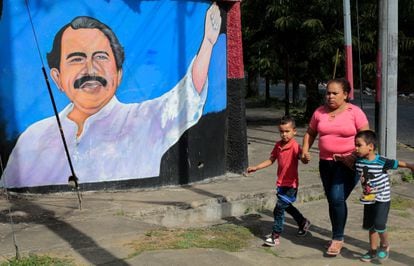
Daniel Ortega and Rosario Murillo will take the presidential oath on Monday afternoon alone. The international community has not only rejected the election in which they were elected without competition in November 2021, after arresting all their contenders, but this morning the United States and the European Union applied joint sanctions against officials of the Sandinista regime. It is an action in response to the perpetuation in power of the presidential couple, which will also be joined by the United Kingdom, according to diplomatic sources consulted by EL PAÍS.
The European Union was the first to emerge with the expansion of sanctions against seven more officials (including the children of the presidential couple Camila and Laureano Ortega Murillo) and three key institutions in the repressive scheme of Sandinismo: the National Police, the Supreme Council Electoral and the Nicaraguan Institute of Telecommunications and Correos (Telcor), entity in charge of a trolley farm to generate disinformation, as revealed a journalistic investigation in June 2021. It is the first time that the European Union has sanctioned Nicaraguan organizations.
Subsequently, the United States hit the hard note by sanctioning six more people, especially three generals of the Nicaraguan army, an institution that has always claimed that it is staying out of political repression, although many human rights organizations accuse it of complicity and inaction in the face of the disarmament of paramilitary groups that operate outside the Constitution. Subsequently, the US also announced that canceled visas for 116 people “Accomplices in undermining democracy in Nicaragua,” including mayors, prosecutors, university administrators, and police, penitentiary, and military officials.
The three sanctioned army generals are Bayardo Ramón Rodríguez Ruiz (chief of the General Staff), Bayardo de Jesús Pulido Ortiz, and Ramón Humberto Calderón Vindell (former inspector general). The three soldiers are directors of the Military Social Welfare Institute (IPSM), the army’s public investment fund and in which the big military businesses are concentrated. The IPSM is one of the investment groups with the highest profitability in Nicaragua. According to military sources, the sanction hits the first line of command, specifically the Chief of the General Staff, who in theory is the eventual successor to the military chief Julio César Avilés.
“It is a fairly direct message to the army,” Elvira Cuadra, a sociologist and security expert, tells EL PAÍS, referring to the fact that the military is considered a key factor of stability for Ortega. “It is clear that international isolation, compared to that of the eighties, during the Sandinista revolution, is greater. In the eighties there were European governments that maintained relations and recognition of the Government. Not now, ”he added.
For its part, the United States Department of the Treasury argued its sanctions that the “fraudulent national elections” in November consolidate “even more its control of power to the detriment of the Nicaraguan people.” “The United States and our partners are sending a clear message to President Ortega, Vice President Murillo, and their inner circle that we continue to support the Nicaraguan people in their calls for the immediate release of these political prisoners and a return to democracy,” he said. Under Secretary for Terrorism and Financial Intelligence Brian E. Nelson.
Join EL PAÍS to follow all the news and read without limits.
Subscribe
López Obrador stumbles
Although Vice President Murillo said that some 300 people from different delegations will accompany them in the presidential oath, so far only the usual ally has landed in Managua: the president of Cuba, Miguel Díaz-Canel. The arrival of Nicolás Maduro, the Venezuelan president, is scheduled. Bolivia will send the Vice Minister of Foreign Relations, Erwin Mamani. Argentina and Mexico said at the time that they would send delegations, but first the southern country retracted and the government of Andrés Manuel López Obrador has made a series of contradictory statements.
Rosario Murillo first announced that the Mexican Foreign Minister, Marcelo Ebrard, would accompany them. This Sunday, sources from the Mexican Foreign Ministry assured that they would send Martín Borrego Llorente, general director for Latin America of the Ministry of Foreign Relations. However, in a surprising twist on Sunday night they retracted, saying that no official would come to Managua. The first information generated criticism and controversy because the Mexican government provided support to one of the regimes that most violates human rights in the region.
However, in López Obrador’s morning press conference the official version was changed again when he said that his country would send Ramiro Ayala, head of the Foreign Ministry at the Mexican Embassy in Nicaragua. “At once I am going to say it, he is the business manager, because we do not have an ambassador, but we are going to ask for approval,” said the Mexican president, who was quick to say that they maintain good relations with all the countries of the region. .
Subscribe here to the newsletter from EL PAÍS América and receive all the informative keys of the current situation of the region
elpais.com
Eddie is an Australian news reporter with over 9 years in the industry and has published on Forbes and tech crunch.